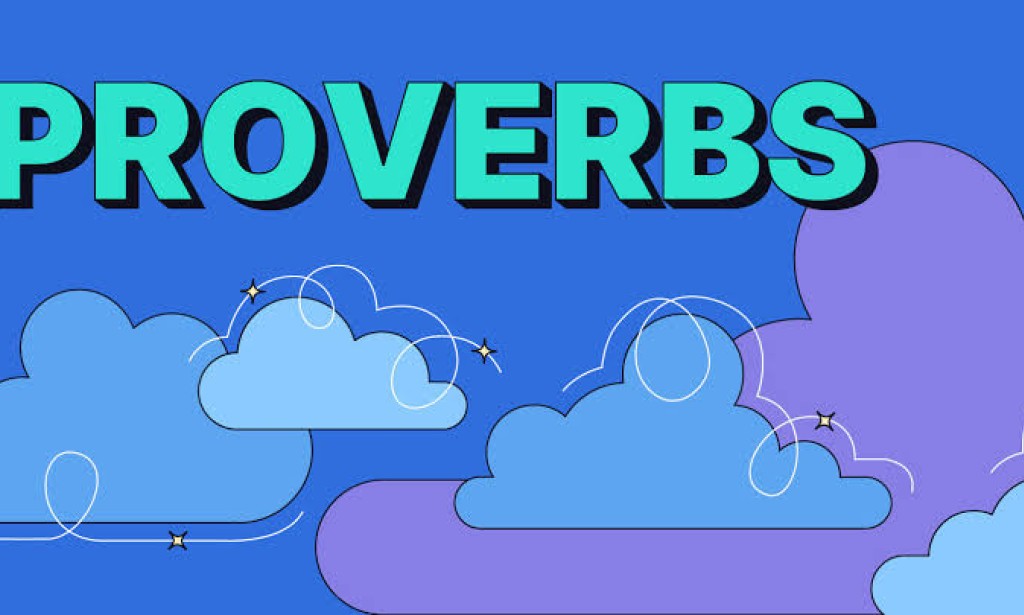TABLE OF CONTENT:
SUMMARY:

Proverbs are short, pithy sayings that encapsulate a piece of wisdom or a cultural value. They have been used in different cultures throughout history to pass down traditions, morals, and values from one generation to the next.
Some of the importance of proverbs in different cultures is that Proverbs serve as a way of transmitting cultural values and beliefs from one generation to the next. They are often used to express complex ideas concisely and memorably. Proverbs are an important part of many cultures' oral traditions. They provide a way of preserving cultural heritage and history by passing down stories, morals, and values through the generations. Proverbs can help promote unity and social cohesion within a culture. They provide a shared understanding and common language that helps people to connect. Proverbs are often used as a way of teaching children important lessons and values. They are easy to remember and can be used as a tool for children to learn about the world around them. Proverbs can offer practical advice on various topics, from personal relationships to financial management. They can guide how to navigate life's challenges and make good decisions.
If we talk about proverb and their importance in different cultures then I will talk about the Indian culture because in India we have different old cultures, religions and traditions. Proverbs hold great importance in Indian culture as they are seen as a rich source of wisdom, knowledge, and insight into life. These proverbs have been passed down from generation to generation and have become an integral part of Indian culture. Here are a few examples:
"Unity in diversity." This proverb highlights the cultural diversity of India and how it is a strength rather than a weakness. It emphasizes the need for people to come together and celebrate their differences while working towards a common goal.

"A friend in need is a friend indeed." This proverb emphasizes the importance of having true friends who will stand by you in times of need. It teaches people to value and cherish their relationships and to always be there for their friends.
"Haste makes waste." This proverb reminds people to slow down and take their time when completing a task. It emphasizes the importance of being patient and thorough to avoid making mistakes that could lead to more work and wasted time.
"Actions speak louder than words." This proverb emphasizes the importance of deeds over words. It teaches people to back up their words with actions and to always follow through on their promises.
As an illustration of African oral histories, proverbs serve as both a textual source and a creative perspective which, inside a brief, convey the viewpoint of African societies. African sayings could communicate various ideas, including analogies, knowledge, irony, pleasure, education, comedy, compassion, morality, sorrow, admiration, politeness, companionship, hatred, faith, social modulation schemes, and violence. Within the African literature collection African Heritage, although careful to suggest the use of proverbs as significant indications of methods of thought and emotions, we should understand how words are interpreted, in which settings and for which aim. Proclaim the proverbs: “There is no wealth where there are no children”. Only in families with children can one experience real pleasure. Kids, however, are more than a joy to be around. People are a huge help to their family members. Whenever parents stop being capable of caring for themselves, the kids take over and take care of them. Kids are a profitable venture and a financial asset for their family members.

The significance of proverbs in African culture is also shown in the novel “Things fall apart” written by Chinua Achebe. The proverbs in the novel serve as a means of communication and are used to pass down knowledge from generation to generation. They are used to teach people about their culture, history, and social norms.
Proverbs are also used as a means of maintaining order and discipline in the community. For example, in chapter one, Okonkwo is told by his uncle, "A man who pays respect to the great paves the way for his greatness." This proverb emphasizes the importance of respect in the community and shows that Okonkwo's ambition to become a great man must be accompanied by humility and respect for his elders.
Moreover, proverbs are used to express complex ideas and emotions succinctly. For example, when Okonkwo kills Ikemefuna, a boy who was like a son to him, he cannot bring himself to say that he killed him. Instead, he uses the proverb "The sun will shine on those who stand before it shines on those who kneel under them." This proverb is a euphemism for killing, and it shows how deeply Okonkwo is affected by what he has done.
Proverbs are a source of wisdom and are often used by characters to express their thoughts and beliefs. For instance, Okonkwo often uses proverbs to express his views on life, such as "the lizard that jumped from the high Iroko tree to the ground said he would praise himself if no one else did." This proverb means that one should be proud of their achievements, even if no one else recognizes them.
As Okonkwo is expelled to his native country, the significance of women in Ibo culture is brought to a head. His uncle, Uchendu, claims: “A man belongs to his fatherland when things are good and life is sweet”, that also conveys an Ibo's perspective on their culture, which also accords about women. It is anticipated that one will encounter proverbs referring to certain funny behaviors in a society that cherishes proverbs and comes from a region that enjoys dancing and performing arts.
CONCLUSION:
Overall, proverbs are an important part of many cultures around the world. They serve as a way of transmitting cultural values, preserving tradition, promoting unity, educating children, and offering advice. We have also seen in the above text that it played a crucial role in Indian Africa and all other cultures. Chinua Achebe has used proverbs in all of his writings, texts and novels. In things fall apart he has talked about the African culture with excessive use of proverbs to give a beautiful look to his text and to explain his ideas more nicely.


You must be logged in to post a comment.